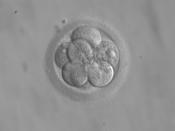There has been an extensive history in the development of In Vitro Fertilisation.
This is evident in the scientific discoveries and advances in medical procedures.
In addition, the church and society have made scientific contributions to the debate concerning In Vitro Fertilisation techniques.
The discovering of human ova and sperm during the 1800's provided a greater understanding of the nature and purpose of reproduction.
These significant developments became the moral concern of the church in 1958 when Pope Pius x11 declared human artificial insemination immoral.
The church upheld its moral stance against IVF techniques and Pope john v1 outlined this is 1968 in the encyclical human Vitae.
Despite the churches stance on the issue, the development of In Vitro Fertilisation techniques continued and resulted in the birth of the first IVF baby, Louise Brown in 1978.
This significant development in reproductive Technology created a great need for the establishment of Louise to determine who can and cannot gain access to IVF and GIFT.
( gamete Intra - fallopian tube transfer)
In vitro Fertilisation is Latin for "in Glass".
In Vitro Fertilisation, which throughout this essay will be represented by IVF, is one type of reproductive technology.
The practice of IVF involves the removal of male and female gametes that are fused together outside of the body and the Zygote (fertilised ova) is then implanted into the uterus in the hope that implantation will occur.
In order for this to occur the male usual is expected to produce sperm through masturbation, which that itself is considered to violate the unitive and procreative meaning of the conjugal act.
IVF was originally used by couples experiencing difficulty in conceiving children due to a blockage in the fallopian tubes.
The new reproductive technology allows pregnancy to occur without the process of the conjugal act.


